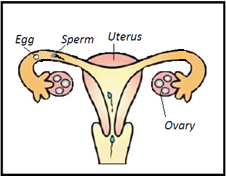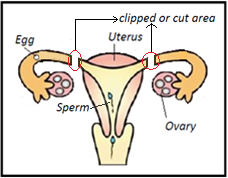Information for patients
This leaflet can be made available in other formats including large print, CD and Braille and in languages other than English, upon request.
What is female steralisation or tubal ligation?
It is a surgical procedure providing a permanent form of contraception. It blocks the fallopian tubes, preventing the egg and sperm meeting, so a pregnancy cannot occur. The egg released each month from the ovary is absorbed by the body instead.
Is it suitable for me?
You should only decide on sterilisation if you are certain that you have completed your family. You should consider unexpected changes in future (e.g. loss of a child or a new relationship). You have to decide yourself and without any pressure or stress (e.g. financial or relationship problems).
How is it done?
After delivering the baby and placenta, and suturing the uterus closed, the surgeon identifies your fallopian tubes on either side of the uterus. The fallopian tubes are then blocked with clips or by cutting and tying. Rarely, it may not be possible to complete the procedure during caesarean section if the surgeon thinks it is dangerous to do so, due to distorted anatomy or adhesions (things sticking together). In such times, it will be better to wait until later or use other contraception methods.
Before

After

Are there alternatives?
Alternatives include continuing with your current method of contraception, barrier methods (condoms), oral contraceptive pill (taken daily), skin patches (changed weekly), contraceptive injection (lasts 8 or 13 weeks depending on which injection you have), contraceptive implant (placed under skin in upper arm, lasts for 3 years), intra-uterine device (coil put into womb, lasts for 5 or 10 years), intra-uterine device (hormonal coil, lasts for 3 or 5 years) or vasectomy (male sterilisation).
How well does it work?
It works immediately as a contraceptive and is more than 99.5% effective. Sterilisation at the time of Caesarean Section may carry a higher chance of failure than sterilisation done at other times due to changes the uterus and fallopian tubes undergo during pregnancy.
Can the procedure fail?
Fallopian tubes are living tissue that can sometimes re-join despite correct techniques, resulting in pregnancy. This can happen even many years after the procedure. If you suspect you are pregnant after sterilisation, you should seek immediate medical advice as there is an increased chance of having an ectopic pregnancy (pregnancy outside the uterus) which can cause dangerous internal bleeding.
What should I expect after the procedure?
Your hormones remain the same and you still get your periods after sterilisation. It does not affect your sex drive or enjoyment of sex. You may feel more relaxed after the procedure as you no longer worry about getting pregnant.
Are there additional risks and complications?
The procedure adds 10 to 15 minutes of operating time to a planned caesarean section. Recovery process is identical to recovering from a caesarean section with no major additional risks or complications.
What is I regret having it done, can it be reversed?
A number of studies have reported that the incidence of regret and dissatisfaction is increased when sterilisation is performed at the time of caesarean section. Reversal of sterilisation is a complex micro-surgical procedure and is unavailable on the NHS. It may need to be done as an open surgery which carries higher risks than a keyhole approach. Sterilisation done at caesarean section means it is less likely to have a successful future reversal. Only about 50% of women achieve a live pregnancy after the reversal. There is also a higher risk of ectopic pregnancy after reversal.
How do I request the procedure?
Speak to your midwife or obstetrician well in advance, during your antenatal appointments who can go through the procedure and add it to your caesarean section booking.
A condom is always a good idea!
No matter what contraception you choose, using a condom is the only way to protect yourself against sexually transmitted infections (STIs).
Contact Numbers
Women’s Outpatients – University Hospital of North Tees
Telephone: 01642 624212
Women’s Outpatients – University Hospital of Hartlepool
Telephone: 01429 522865
Sources used for information in this leaflet
Rani, R., Sharma, R., & Kohli, C. (2020). Female sterilization failure, consequences and further contraception: a review of cases over ten years. International Journal of Reproduction, Contraception, Obstetrics and Gynecology, 9(10), 4033.
Kariminia, A., Saunders, D. M., & Chamberlain, M. (2002). Risk factors for strong regret and subsequent IVF request after having tubal ligation. Australian and New Zealand journal of obstetrics and gynaecology, 42(5), 526-529.
For more information
Family Planning Association
https://www.sexwise.org.uk/contraception/sterilisation
Comments, concerns, compliments or complaints
Patient Experience Team (PET)
We are continually trying to improve the services we provide. We want to know what we’re doing well or if there’s anything which we can improve, that’s why the Patient Experience Team (PET) is here to help. Our Patient Experience Team is here to try to resolve your concerns as quickly as possible. The office is based on the ground floor at the University Hospital of North Tees if you wish to discuss concerns in person. If you would like to contact or request a copy of our PET leaflet, please contact:
Telephone: 01642 624719
Freephone: 0800 092 0084
Opening hours: Monday to Friday, 9:30am to 4:00pm
Email: [email protected]
Out of hours
Out of hours if you wish to speak to a senior member of Trust staff, please contact the hospital switchboard who will bleep the appropriate person.
Telephone: 01642 617617
Data protection and use of patient information
The Trust has developed Data Protection policies in accordance with Data Protection Legislation (UK General Data Protection Regulations and Data Protection Act 2018) and the Freedom of Information Act 2000. All of our staff respect these policies and confidentiality is adhered to at all times. If you require further information on how we process your information please see our Privacy Notices.
Telephone: 01642 383551
Email: [email protected]
Privacy NoticesLeaflet feedback
This leaflet has been produced in partnership with patients and carers. All patient leaflets are regularly reviewed, and any suggestions you have as to how it may be improved are extremely valuable. Please write to the Clinical Governance team, North Tees and Hartlepool NHS Foundation Trust, University Hospital of North Tees, TS19 8PE or:
Email: [email protected]
Leaflet Reference: PIL1403
Date for Review: 10/05/2026